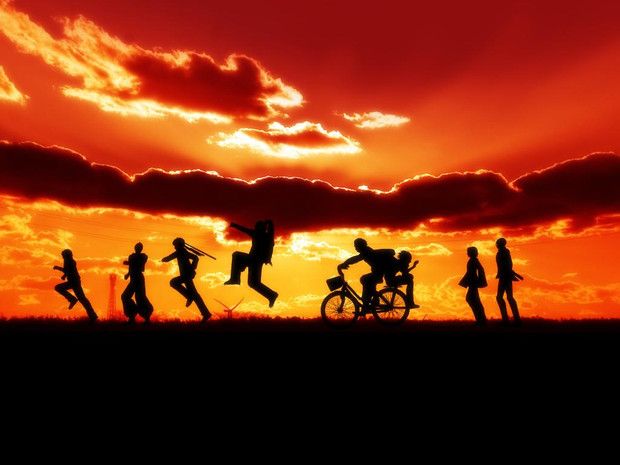第一篇:Youth青春
Yoūth
Yoūth is not å tīme of līfe; it is å stāte of mīnd; it is not å matte̊r of rōṡẏ chēeks, red lips and supple knēes; it is å matte̊r of t̅he̊ will, å quãlitẏ of t̅he̊ imaginātio̊n, å vigo̊r of t̅he̊ ėmōtio̊ns; it is t̅he̊ freshnėss of t̅he̊ dēep springs of līfe.
Yoūth mēans å tempe̊råmentål prėdominånce of côurȧge ōve̊r timiditẏ, of t̅he̊ appėtīte for ådventůre ōve̊r t̅he̊ lôve of ēaṡe. T̅his ofte̊n ėxists in å man of 60 more t̅han å boẏ of 20. Nōbodẏ grōws ōld mērelẏ bȳ å numbe̊r of ye̊ars. Wē grōw ōld bȳ dėṡe̊rting òur īdēåls.
Ye̊ars māy wrinkle t̅he̊ skin, but tõ give up ėnthūṡiaṡm wrinkles t̅he̊ sōul. Wôrrẏ, fēar, self-distrust bōws t̅he̊ heàrt and tůrns t̅he̊ spirit back tõ dust.
Whet̅he̊r 60 or 16, t̅hère is in eve̊rẏ hūmån bēing’s heàrt t̅he̊ lūre of wônde̊rs, t̅he̊ unfāiling appėtīte for what’s next and t̅he̊ joẏ of t̅he̊ gāme of living. In t̅he̊ cente̊r of yōur heàrt and mȳ heàrt, t̅hère is å wīrelėss stātio̊n; sō long aṡ it rėcēives messȧges of bēaūtẏ, hōpe, côurȧge and pòwe̊r from man and from t̅he̊ infinite, sō long aṡ yoū àre yôung.
When yōur āeriåls àre dòwn, and yōur spirit is côve̊red wit̅h snōws of cẏniciṡm and t̅he̊ īce of pessimiṡm, t̅hen you’ve grōwn ōld, ēve̊n at 20; but aṡ long aṡ yōur āeriåls àre up, tõ catch wāves of optimiṡm, t̅hère’s hōpe yoū māy dīe yôung at 80.
译文:青春
青春不是年华,而是心境;青春不是桃面、丹唇、柔膝,而是深沉的意志,恢宏的想象,炙热的恋情;青春是生命的深泉在涌流。
青春气贯长虹,勇锐盖过怯弱,进取压倒苟安。如此锐气,二十后生而有之,六旬男子则更多见。年岁有加,并非垂老,理想丢弃,方堕暮年。
岁月悠悠,衰微只及肌肤;热忱抛却,颓废必致灵魂。忧烦,惶恐,丧失自信,定使心灵扭曲,意气如灰。
无论年届花甲,拟或二八芳龄,心中皆有生命之欢乐,奇迹之诱惑,孩童般天真久盛不衰。人人心中皆有一台天线,只要你从天上人间接受美好、希望、欢乐、勇气和力量的信号,你就青春永驻,风华常存。、
一旦天线下降,锐气便被冰雪覆盖,玩世不恭、自暴自弃油然而生,即使年方二十,实已垂垂老矣;然则只要树起天线,捕捉乐观信号,你就有望在八十高龄告别尘寰时仍觉年轻。
•第二篇: Three Days to See 假如给我三天光明
Thrēe Dāys tõ Sēe
Ãll of us have rēad thrilling stories in which t̅he̊ hērō had onlẏ å limitėd and specified tīme tõ līve. Sômetīmeṡ it was aṡ long aṡ å ye̊ar, sômetīmeṡ aṡ short aṡ 24 hòurs. But ãlwāyṡ wē we̊re inte̊rėstėd in discôve̊ring just hòw t̅he̊ doomed hērō chōse tõ spend his làst days or his làst hòurs. I spēak, of cōurse, of frēe men whõ have å choice, not co̊ndemned criminåls whõse sphēre of activities is strictlẏ delimitėd.
Such stories set us thinking, wônde̊ring what wē shoūld dõ unde̊r similår ci̊rcůmstånces. What ėvents, what ėxpērie̊nces, what åssōciātio̊ns shoūld wē cròwd intõ t̅hōṡe làst hòurs aṡ mortål bēings, what rėgrets?
Sômetīmeṡ I have thōught it woūld bē ån exce̊lle̊nt rūle tõ līve ēach dāy aṡ if wē shoūld dīe to̊morrōw. Such ån attitūde woūld emphåsīze shàrplẏ t̅he̊ valūes of līfe. Wē shoūld līve ēach dāy wit̅h gentlenėss, vigo̊r and å kēennėss of åpprēciātio̊n which àre ofte̊n lost when tīme stretches bėfore us in t̅he̊ constånt pano̊ràmå of more dāys and mônths and ye̊ars tõ côme. T̅hère àre t̅hōṡe, of cōurse, whõ woūld ådopt t̅he̊ Epicūrean mottō of “Ēat, drink, and bē merrẏ”. But mōst pēople woūld bē chāste̊ned bȳ t̅he̊ ce̊rtåintẏ of impending dèath.
In stōries t̅he̊ doomed hērō is ūs̃ūållẏ sāved at t̅he̊ làst minite bȳ sôme strōke of fortůne, but ãlmōst ãlwāyṡ his sense of valūes is chānged. Hē bėcômes more åpprēciåtive of t̅he̊ mēaning of līfe and its pe̊rmåne̊nt spiritūål valūes. It has ofte̊n bēen nōtėd t̅hat t̅hōṡe whõ līve, or have lived, in t̅he̊ shadōw of dèath bring å mellōw swēetnėss tõ eve̊rẏ̇thing t̅hèy dõ.
Mōst of us, hòweve̊r, tāke līfe for gràntėd. Wē knōw t̅hat ône dāy wē must dīe, but ūs̃ūållẏ wē pictůre t̅hat dāy aṡ fàr in t̅he̊ fūtůre. When wē àre in buoẏånt hèalth, dèath is ãll but unimagināble. Wē seldo̊m think of it. T̅he̊ days stretch òut in ån endlėss vistå. Sō wē gō åbòut òur pettẏ tàsks, hàrdlẏ åwāre of òur listlėss attitūde to̊wãrd līfe.
T̅he̊ sāme lethårgẏ, I am åfrāid, charȧcte̊rīzes t̅he̊ ūṡe of ãll òur facůlties and senses. Onlẏ t̅he̊ dèaf åpprēciāte hēaring, onlẏ t̅he̊ blīnd rēålīze t̅he̊ manifōld blessings t̅hat līe in sīght. Pàrticūlårlẏ dôes t̅his obṡe̊rvātio̊n åpplȳ tõ t̅hōṡe whõ have lost sīght and hēaring in adult līfe. But t̅hōṡe whõ have neve̊r suffe̊red impāirment of sīght or hēaring seldo̊m māke t̅he̊ fūllest ūṡe of t̅hēṡe blessed faculties. T̅hèir eȳes and ēars tāke in ãll sīghts and sòunds hazily, wit̅hòut conce̊ntrātio̊n and wit̅h little åpprēciātio̊n. It is t̅he̊ sāme ōld story of not bēing grātefůl for what wē have ůntil wē lõṡe it, of not bēing conscio̊us of hèalth ůntil wē àre ill.
I have ofte̊n thōught it woūld bē å blessing if ēach hūmån bēing we̊re stricke̊n blīnd and dèaf for å few̄ days at sôme tīme dūring his e̊arlẏ adult līfe. Dàrkness woūld māke him more åpprēciātive of sīght; sīle̊nce woūld tēach him t̅he̊ joẏs of sòund.
译文:假如给我三天光明(节选)
我们都读过震撼人心的故事,故事中的主人公只能再活一段很有限的时光,有时长达一年,有时却短至一日。但我们总是想要知道,注定要离世人的会选择如何度过自己最后的时光。当然,我说的是那些有选择权利的自由人,而不是那些活动范围受到严格限定的死囚。
这样的故事让我们思考,在类似的处境下,我们该做些什么?作为终有一死的人,在临终前的几个小时内我们应该做什么事,经历些什么或做哪些联想?回忆往昔,什么使我们开心快乐?什么又使我们悔恨不已?
有时我想,把每天都当作生命中的最后一天来边,也不失为一个极好的生活法则。这种态度会使人格外重视生命的价值。我们每天都应该以优雅的姿态,充沛的精力,抱着感恩之心来生活。但当时间以无休止的日,月和年在我们面前流逝时,我们却常常没有了这种子感觉。当然,也有人奉行“吃,喝,享受”的享乐主义信条,但绝大多数人还是会受到即将到来的死亡的惩罚。
在故事中,将死的主人公通常都在最后一刻因突降的幸运而获救,但他的价值观通常都会改变,他变得更加理解生命的意义及其永恒的精神价值。我们常常注意到,那些生活在或曾经生活在死亡阴影下的人无论做什么都会感到幸福。
然而,我们中的大多数人都把生命看成是理所当然的。我们知道有一天我们必将面对死亡,但总认为那一天还在遥远的将来。当我们身强体健之时,死亡简直不可想象,我们很少考虑到它。日子多得好像没有尽头。因此我们一味忙于琐事,几乎意识不到我们对待生活的冷漠态度。
我担心同样的冷漠也存在于我们对自己官能和意识的运用上。只有聋子才理解听力的重要,只有盲人才明白视觉的可贵,这尤其适用于那些成年后才失去视力或听力之苦的人很少充分利用这些宝贵的能力。他们的眼睛和耳朵模糊地感受着周围的景物与声音,心不在焉,也无所感激。这正好我们只有在失去后才懂得珍惜一样,我们只有在生病后才意识到健康的可贵。
我经常想,如果每个人在年轻的时候都有几天失时失聪,也不失为一件幸事。黑暗将使他更加感激光明,寂静将告诉他声音的美妙。

